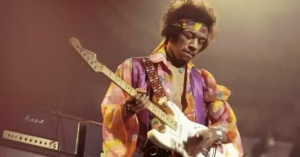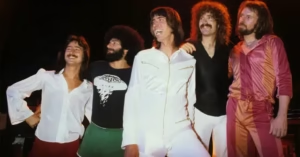The Doors: Psychedelic Shamans of Rock ‘n’ Roll
The Doors. Formation and Origins
The Doors formed in Los Angeles in 1965, blending , blues, jazz, and poetry into a haunting and often mystical sound.
The Doors. Original lineup:
- Jim Morrison – Vocals, lyrics
- Ray Manzarek – Keyboards
- Robby Krieger – Guitar
- John Densmore – Drums
Morrison and Manzarek were UCLA film school classmates. Their name was inspired by Aldous Huxley’s The Doors of Perception, referencing the idea of expanded consciousness through altered states.
The Doors. Breakthrough and Psychedelic Impact
✦ The Doors (1967)
Their debut album remains one of rock’s most iconic debuts.
Key tracks:
- “Light My Fire” – #1 hit with an extended organ-guitar jam
- “Break On Through (To the Other Side)” – Morrison’s statement of intent
- “The End” – A sprawling, Oedipal epic that defined their mystique
✦ Strange Days (1967)
Released the same year, it continued their momentum with:
- “People Are Strange” – Alienation in 3/4 time
- “Love Me Two Times”
- Use of Moog synthesizers and studio experimentation
III. The Doors’ Signature Sound
Their uniqueness came from:
- No bass player — Manzarek played basslines on a Fender Rhodes keyboard
- Morrison’s lyrical depth, influenced by Rimbaud, Nietzsche, and the Beat poets
- A blend of darkness and sensuality, making them a countercultural icon
- Mixing Eastern scales, blues riffs, and flamenco touches in Krieger’s guitar work
The Doors. Controversy and Creative Tension
✦ Waiting for the Sun (1968)
- “Hello, I Love You” – Chart-topping single
- “Five to One” – Apocalyptic and rebellious
- Some criticized the album as a step down from earlier work
✦ The Soft Parade (1969)
- Their most orchestral and polarizing album
- “Touch Me” – A Top 10 hit with strings and horns
- Morrison was increasingly alcohol-dependent and erratic, distancing himself from the band’s pop direction
The Doors. Return to Form and Morrison’s Final Years
✦ Morrison Hotel (1970)
A blues-rock revival featuring:
- “Roadhouse Blues” – A classic barroom anthem
- “Peace Frog,” “Waiting for the Sun” (finally released track)
✦ L.A. Woman (1971)
Their last album with Morrison, praised for its gritty depth.
Key tracks:
- “Riders on the Storm” – Mournful and jazzy, with thunder effects
- “Love Her Madly”
- “L.A. Woman” – A 7-minute ode to Los Angeles and chaos
Shortly after recording, Jim Morrison moved to Paris, where he died on July 3, 1971, at age 27.
VI. After Morrison: Decline and Legacy
- The Doors released two post-Morrison albums (Other Voices, Full Circle) with Manzarek and Krieger sharing vocals — but they failed commercially
- The band dissolved by 1973
Later projects included:
- Manzarek–Krieger reunions (without Densmore’s participation)
- 1991 biopic The Doors, directed by Oliver Stone (with Val Kilmer as Morrison)
- An American Prayer (1978) – Morrison’s spoken-word poems set to new music
VII. Legacy and Influence
The Doors are known for:
- Being poets and provocateurs, mixing existentialism, mysticism, and sensuality
- Creating a dark, theatrical brand of rock rarely matched in intensity
- Their timeless appeal to rebellion, freedom, and the unknown
Accolades:
- Over 100 million records sold worldwide
- Inducted into the Rock and Roll Hall of Fame in 1993
- Rolling Stone consistently ranks The Doors and L.A. Woman among the best albums ever
Influenced:
- , Nick Cave, Iggy Pop
- Joy Division, Echo & the Bunnymen, The Cult
- Marilyn Manson, The Black Angels, and many alternative/psychedelic acts
VIII. Interesting Facts
- Morrison often referred to himself as the “Lizard King”, a persona rooted in Native American mythology and hallucinatory poetry
- “The End” was banned by many radio stations due to explicit lyrics
- Their 1969 Miami concert led to Morrison’s arrest for indecent exposure (a charge later pardoned)
- Ray Manzarek’s keyboard work is considered some of the most innovative in rock, seamlessly blending classical, jazz, and psychedelia




